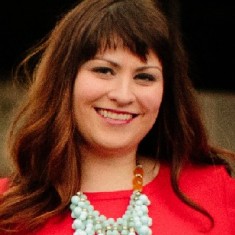Genevieve Misfeldt Sonty ’04

When you arrived at Lake Forest College, did you know you wanted to major in history?
Yes, my freshman World history teacher cultivated my curiosity in the subject and from that point forward, I knew history was the discipline I wanted to study and teach. While personal experiences led me to study the historical origins of inequity and injustice, I was drawn to the ways in which individuals, policies, and structures address these significant challenges. Guided by a commitment to social justice and human rights, I continue to make this study a part of my work as a history teacher as Highland Park High School.
What was your area of focus in history?
I specialized in American history, with an emphasis on the 20th century. I fondly recall writing about ‘Fighting Bob’ LaFollette from my home state of Wisconsin in Rosswurm’s HIST 121: Modern America and HIST 328: Race and Racism, where we traced the roots of racism back to its earliest chapters in American history to illuminate the institution in its present context.
I have no doubt that my training successfully prepared me to teach American Studies to high school students after graduation.
Was there a particular piece of work that you remember as especially rewarding or challenging?
I remember HIST 120 with Professor Ebner like it was yesterday. It was the first class I took in the History department my first semester at LFC. It was so intimidating initially that I thought I wanted to drop out of school and transfer to a school closer to home (looking back, I laugh at the thought of this). In reflection, what was so intimidating about it were the expectations Professor Ebner had for his students: writing a one-page paper for every class, lots of reading (!), contributing to discussion. It was intimidating because he believed I could do it. I had never had a teacher challenge me in that way before. After just a few weeks, I began to believe I could do it too. Professor Ebner helped me recognize my own strengths and his encouragement helped to motivate me through the rest of my experiences at the College. He would serve as my advisor throughout my four years, including supervising my senior symposium topic, and continues to act as a mentor to me today. His belief in me and the high expectations he held for his students are characteristics I try to emulate with my students.
While my senior writing wasn’t a thesis per say–it was a labor of love. Under Professor Ebner’s supervision, I wrote about the role that Chief Justice Earl Warren played in the unanimous Brown decision and subsequently, President Eisenhower’s reluctant leadership in the Civil Rights Movement. I loved the ownership I had in the process–every source I found was up to me to interpret, to place into context, to weigh carefully. And I’ll admit, while the initial page limitations scared me (I recall it being close to 40 pages–a far cry from the one page that used to intimidate me in HIST 120), by the time my research was complete, the paper wrote itself. It’s a piece of work I’m still really proud of because I think it symbolizes my evolution as a student of history.
How did your history major prepare you for advanced studies?
I have my Masters degree in Education from Loyola University, yet I would credit my history degree for my success in that program. In order to be an educational leader, one must understand our nation’s history and its legal institutions. From my School Law class to the Philosophy of Education, my experiences at Lake Forest College prepared me to succeed in a Masters level program. Both in terms of content and skills–I knew how to construct an argument and write coherently and persuasively. I had valuable prior knowledge to allow me to explore topics more deeply and to ask more nuanced questions. I became the go-to person when my peers had questions because I had the content background.
Many of our students worry that traditional liberal arts majors (particularly in the humanities) will not translate to job skills. Share your advice.
As a former department chair responsible for hiring future Social Studies teachers, I was always impressed with students who had a major in History (or a double major in History and Education) because their content knowledge was strong. An increasing number of candidates enter the field of education without a strong foundation of content in their area of instruction. It’s one of the things I loved most about my program at Lake Forest College–I was required to double major. A History major gives you the chance to become an expert researcher and writer in a field or topic of interest to you, while also giving you a broader context to understand larger patterns. That’s a unique skill–one that’s incredibly valuable in today’s job market.
How do the skills and knowledge you acquired in your history major inform your day-to-day work?
- The power of primary source material in transforming the way students think about history as a discipline.
- I am mindful of the need for multiple perspectives, of other sources, of the stories that are missing when it comes to making decisions for kids.
- The ability to write well. As a teacher of history, I am also a teacher of writing. I apply the lessons I learned in Young Hall everyday (no joke!) as I help my students grow in their ability to express an argument cogently.
- My training in history has equipped me with a questioning habit of mind and my masters’ degree has further sharpened my approach of framing questions within a larger social and educational context.
Is there anything else you would like to add?
Can I come back and be a student again?